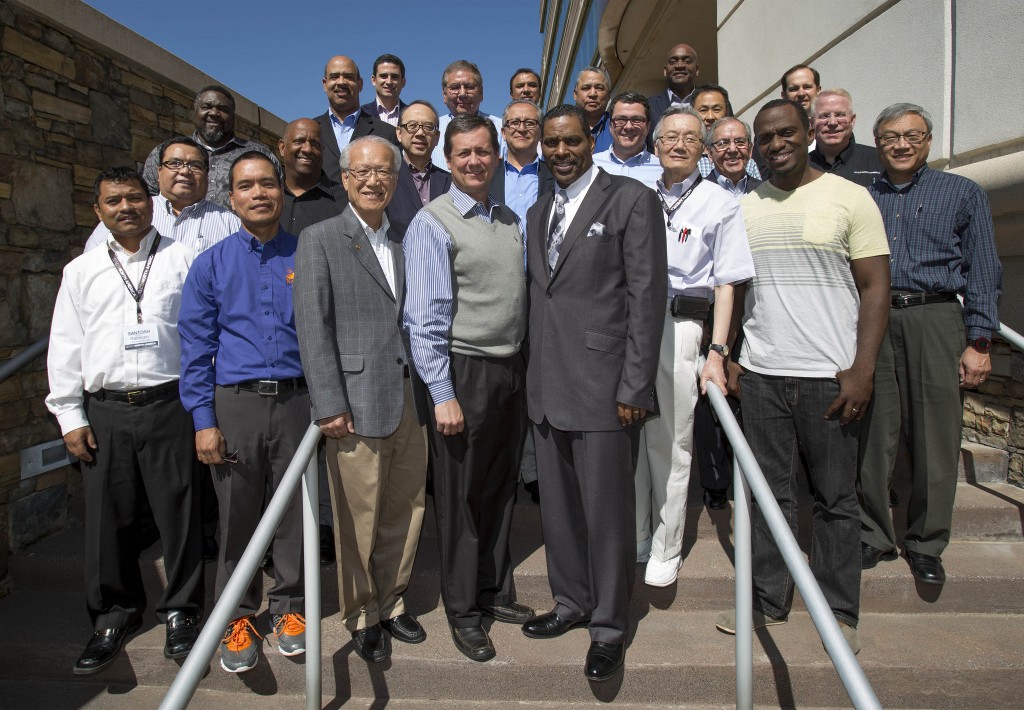People-group ministry is often viewed as an international concern, but the executive leadership at the North American Mission Board (NAMB) is making an effort to highlight the importance and develop the scope of Southern Baptist people-group efforts in North America, too.
“The ethnic population is growing faster than the Anglo population in the United States,” said NAMB Senior Assistant to the President, Kim Robinson, noting that about 58 percent of the new churches added to the Southern Baptist Convention in 2013 and 2014 are reported to be minority congregations.
To address this growing need, Robinson and NAMB President, Kevin Ezell, hosted a two-day summit at NAMB’s Alpharetta building. More than 20 Southern Baptist leaders representing several different ethnic groups sat down to discuss current outreach efforts and explore how NAMB could effectively help plant churches for diverse populations in cooperation with ethnic Southern Baptist groups like the National African American Fellowship, the Vietnamese Baptist Fellowship of North America, the Native Fellowship of Christians, the Chinese Baptist Fellowship of the U.S. and Canada, and others.

The North American Mission Board (NAMB) hosted a two-day summit to address collaboration and partnership to strength ethnic church planting and people group focus in North America. Among the leaders participating with NAMB staff was K. Marshall Williams, Sr., president of the National African American Fellowship, who said of the proceedings prayerful emphasis, “If we don’t dialogue with the divine—if dust doesn’t talk to deity—nothing is going to happen.” Pictured at center, front with Williams, is NAMB president Kevin Ezell who helped facilitate the dialog. Also in attendance were Byron Day, A.B. Vines, Dennis Manpoong Kim, Christian Phan, Abraham Chiu, Ted Lam, Jeremiah Lepasana, Bobby Sena, Rolando Castro Salas, Erick Zaldana, Emerson Falls, Santosh Ramdam, Mokhles Bekhet and NAMB staff Carlos Ferrer, Gary Frost, Jeff Christopherson, Kim Robinson, Jason Kim, Jeremy Sin, Ramon Osario, Gary Hawkins, Aslam Masih, Dhati Lewis, Neal Hughes, Clark Logan, Jerry Daniel, Greg Murphree, Chad Childress, Shane Critser, and Mike Ebert. NAMB photo by John Swain
“We did not invite you here just to get to know you. We didn’t invite you here just to come and share the particular needs of each area. We’re really ready to stand with you. To speak up at the appropriate time, and to sacrificially, come together to have a shared goal of how we’re going to get this done,” said Ezell.
“We have a very strong desire to accelerate ethnic church planting, but we know we can’t do that by ourselves,” Robinson explained to the group in his opening remarks. “That comes from pastor-led churches leading their congregations into church planting. So we want to partner with you to help plant more than we could if we tried to do it alone. It’s not that you need to join forces with us, and we are your leaders. We want to join forces with you.”
Throughout the two days, participants spent time in both large group sessions and small-group meetings where they explored ways that their respective fellowships could work symbiotically.
“We’re really ready to stand with you. To speak up at the appropriate time, and to sacrificially come together to have a shared goal of how we’re going to get this done.” — Kevin Ezell
“We would like to advocate the potential of partnership with other ethnic groups, so that we could add value to the kingdom work here in the U.S.,” said Filipino leader, Jerry Lepasana. “It is encouraging for me and for my congregation to cross over the ethnic boundaries to help other people start new churches,” agreed Reverend Dennis Manpoong Kim of the Global Mission Church, adding that, “I have a clearer understanding of what we are trying to do together, and I give thanks to God.”
“We constantly update these maps,” said Ezell. “We don’t just come up with these numbers arbitrarily. We meet with people locally who have investment and expertise there, and we put the information on the map for everybody to see.”One of the major organizational instruments introduced at the summit was the NAMB Church Plant Map,www.namb.net/map. This interactive online tool allows pastors, planters and church members to see both current church plants and potential plants by ethnic group alongside census statistics. The data presented is the result of research and on-the-ground expertise from missionaries and pastors living in the area.
Many leaders echoed a desire for increased collaboration and communication between their organizations and NAMB, too. The tools and initiatives presented by NAMB’s mobilization team sparked enthusiasm for the potential to partner in ministry and magnify the groups’ respective strengths—especially as it relates to the specific cultural context of each ethnic group.
“You’ve got dots on the map, and so do we,” said Emmerson Falls, Chairman of the Native Fellowship of Christians, in reference to NAMB’s extensive map of target church plants. “Where they overlap, let’s partner together—it just makes sense.”
An over-arching refrain of the meetings was a bond of fellowship forged through prayer. “If we don’t dialogue with the divine—if dust doesn’t talk to deity—nothing is going to happen,” President of the National African American Fellowship, K. Marshall Williams, Sr., said of the proceedings.
And while the group assembled under the banner of diversity, it was a tone of unity that pervaded throughout the meetings. “I really believe that God has brought us together for such a time as this,” said Ezell. “God has brought us together for a purpose, and it’s not just to grow in fellowship with one another but to leave here with some action points. What are we going to do, and what are we going to do together?”
K. Faith Morgan writes for the North American Mission Board.






